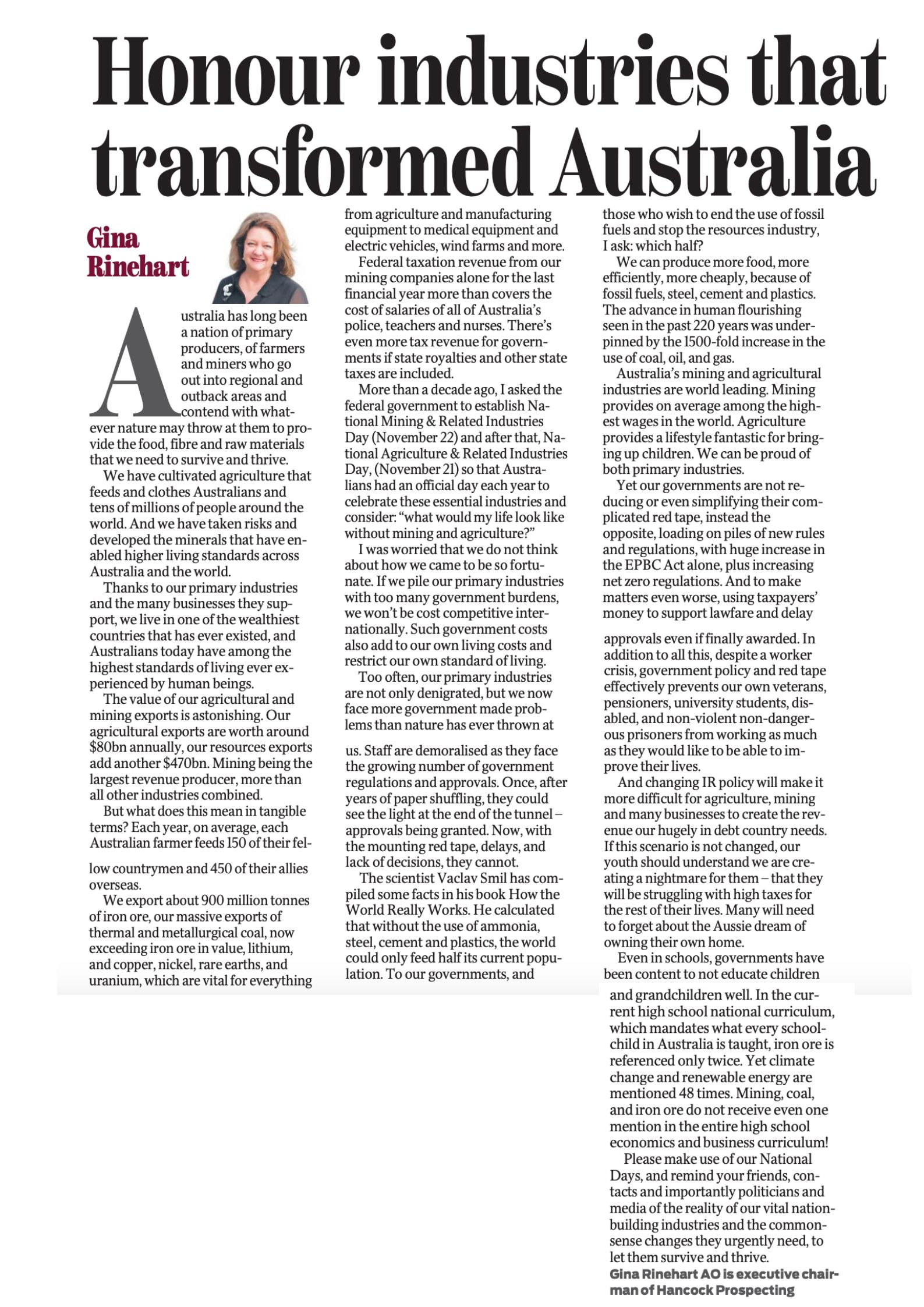Honour industries that transformed Australia
Australia has long been a nation of primary producers, of farmers and miners who go out into regional and outback areas and contend with whatever nature may throw at them to provide the food, fibre and raw materials that we need to survive and thrive. We have cultivated agriculture that feeds and clothes Australians and tens of millions of people around the world. And we have taken risks and developed the minerals that have enabled higher living standards across Australia and the world. Thanks to our primary industries and the many businesses they support, we live in one of the wealthiest countries that has ever existed, and Australians today have among the highest standards of living ever experienced by human beings.

Article by Mrs Gina Rinehart AO courtesy of the Courier Mail.

Australia has long been a nation of primary producers, of farmers and miners who go out into regional and outback areas and contend with whatever nature may throw at them to provide the food, fibre and raw materials that we need to survive and thrive.
We have cultivated agriculture that feeds and clothes Australians and tens of millions of people around the world. And we have taken risks and developed the minerals that have enabled higher living standards across Australia and the world.
Thanks to our primary industries and the many businesses they support, we live in one of the wealthiest countries that has ever existed, and Australians today have among the highest standards of living ever experienced by human beings.
The value of our agricultural and mining exports is astonishing. Our agricultural exports are worth around $80bn annually, our resources exports add another $470bn. Mining being the largest revenue producer, more than all other industries combined.
But what does this mean in tangible terms? Each year, on average, each Australian farmer feeds 150 of their fellow countrymen and 450 of their allies overseas.
We export about 900 million tonnes of iron ore, our massive exports of thermal and metallurgical coal, now exceeding iron ore in value, lithium, and copper, nickel, rare earths, and uranium, which are vital for everything from agriculture and manufacturing equipment to medical equipment and electric vehicles, wind farms and more.
Federal taxation revenue from our mining companies alone for the last financial year more than covers the cost of salaries of all of Australia’s police, teachers and nurses. There’s even more tax revenue for governments if state royalties and other state taxes are included.
More than a decade ago, I asked the federal government to establish National Mining & Related Industries Day (November 22) and after that, National Agriculture & Related Industries Day, (November 21) so that Australians had an official day each year to celebrate these essential industries and consider: “what would my life look like without mining and agriculture?”
I was worried that we do not think about how we came to be so fortunate. If we pile our primary industries with too many government burdens, we won’t be cost competitive internationally. Such government costs also add to our own living costs and restrict our own standard of living. Too often, our primary industries are not only denigrated, but we now face more government made problems than nature has ever thrown at us.
Staff are demoralised as they face the growing number of government regulations and approvals. Once, after years of paper shuffling, they could see the light at the end of the tunnel approvals being granted. Now, with the mounting red tape, delays, and lack of decisions, they cannot. The scientist Vaclav Smil has compiled some facts in his book How the World Really Works. He calculated that without the use of ammonia, steel, cement and plastics, the world could only feed half its current population.
To our governments, and those who wish to end the use of fossil fuels and stop the resources industry, I ask: which half? We can produce more food, more efficiently, more cheaply, because of fossil fuels, steel, cement and plastics. The advance in human flourishing seen in the past 220 years was underpinned by the 1500-fold increase in the use of coal, oil, and gas. Australia’s mining and agricultural industries are world leading.
Mining provides on average among the highest wages in the world. Agriculture provides a lifestyle fantastic for bringing up children. We can be proud of both primary industries. Yet our governments are not reducing or even simplifying their complicated red tape, instead the opposite, loading on piles of new rules and regulations, with huge increase in the EPBC Act alone, plus increasing net zero regulations.
And to make matters even worse, using taxpayers’ money to support lawfare and delay approvals even if finally awarded. In addition to all this, despite a worker crisis, government policy and red tape effectively prevents our own veterans, pensioners, university students, disabled, and non-violent non-dangerous prisoners from working as much as they would like to be able to improve their lives.
And changing IR policy will make it more difficult for agriculture, mining and many businesses to create the revenue our hugely in debt country needs. If this scenario is not changed, our youth should understand we are creating a nightmare for them that they will be struggling with high taxes for the rest of their lives.
Many will need to forget about the Aussie dream of owning their own home. Even in schools, governments have been content to not educate children and grandchildren well. In the current high school national curriculum, which mandates what every schoolchild in Australia is taught, iron ore is referenced only twice. Yet climate change and renewable energy are mentioned 48 times.
Mining, coal, and iron ore do not receive even one mention in the entire high school economics and business curriculum! Please make use of our National Days, and remind your friends, contacts and importantly politicians and media of the reality of our vital nationbuilding industries and the commonsense changes they urgently need, to let them survive and thrive.
Gina Rinehart AO is executive chairman of Hancock Prospecting
